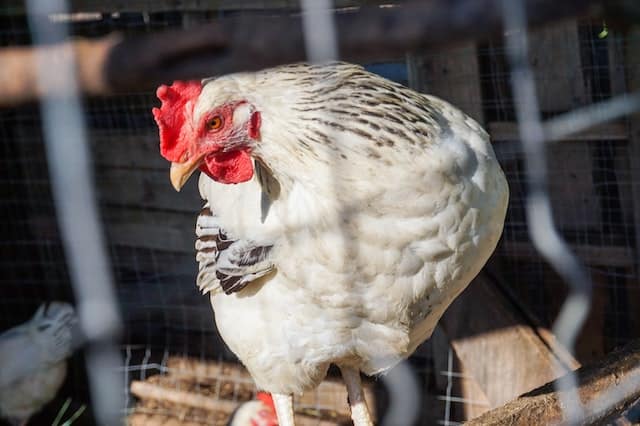
Raising chickens can be a fun and rewarding experience, but it can also be challenging for new chicken owners to determine when their chickens will start laying eggs. Understanding the signs of chicken behavior before laying their first egg can help you know when to expect your first egg.
Contents
Chicken Behaviour Before Laying First Egg
Swollen Reddening Combs and Wattles
One of the first signs of a chicken preparing to lay her first egg is the enlargement and reddening of her comb and wattles. This is due to increased blood flow to these areas, resulting from the hormonal changes taking place as the chicken prepares to lay an egg.
She May Start To Explore the Nesting Box Area
As chickens age the age of laying their first egg, they will show more interest in the nesting box area. They may start to scratch around in the box or even start roosting in it.
Perhaps install a chicken cam in your coop so you can keep an eye out without so many trips outside?
She May Start To Vocalize More
Another sign that your chicken is about to lay her first egg is an increase in vocalization. Chickens often make noise when they are laying eggs, which can be anything from a soft clucking noise to a loud squawk.
Increased Appetite
As a chicken approaches the time to lay her first egg, she may also show an increase in appetite. This is due to the increased energy demands of egg production. Be sure there’s lots of wholesome food available for her.
Submissive Squat
The submissive squat is a sure sign that your chicken is about to lay her first egg. This is when the chicken squats down and spreads her wings out, allowing you to approach her and collect the egg.
When Will She Lay Again?
Once a chicken starts laying eggs, she will typically lay one egg every 24-36 hours. However, this can vary depending on factors such as the time of year, the chicken’s age, and her overall health.
This coincides with how long it takes to lay an egg each day. The time it takes for a chicken to lay an egg each day can vary, but on average, it takes 25-30 hours to lay an egg.
It’s amazing when you think of it! A flock of fewer than twenty hens will produce around 100 eggs per week! That’s enough to keep you and your neighbors in eggs. You may just want to go into the egg business!
Related: Why Do Chickens Lay Unfertilized Eggs?
When Do the Different Chicken Breeds Start Laying?
The age at which different chicken breeds start laying eggs can vary greatly. Some breeds, such as the Leghorn, can start laying as early as 4-5 months of age, while others, such as the Plymouth Rock, may not start until they are 6-7 months old.
So, the age at which chickens start laying eggs can vary greatly depending on the breed, but on average, most chickens will start laying eggs between 5-6 months of age. Outliers will be as early as four months or as late as seven months.
Why Do Chickens Lay More Eggs Sometimes?
Chickens can lay more eggs for a variety of reasons, including:
- Increased daylight – Chickens are photoperiodic, which means that they lay more eggs in the spring and summer when there is increased daylight.
- Optimal environmental conditions – Chickens lay more eggs when they are comfortable, so factors such as temperature, humidity, and access to food and water can affect their laying patterns.
- Improved diet – Chickens given a balanced and nutritious diet will generally lay more eggs than those not.
- Genetics – Some chicken breeds are naturally more productive than others and may lay more eggs.
In terms of seasonal patterns, chickens will typically lay more eggs during the spring and summer months when there is increased daylight.
However, with proper lighting and management, it is possible to encourage chickens to lay more eggs year-round.
In Summary
In conclusion, being able to recognize the signs of chicken behavior before laying their first egg can help you know when to expect your first egg and prepare accordingly. Understanding the behavior and characteristics of your chickens will help you provide them with the best care possible.
Photo by Idella Maeland on Unsplash.

